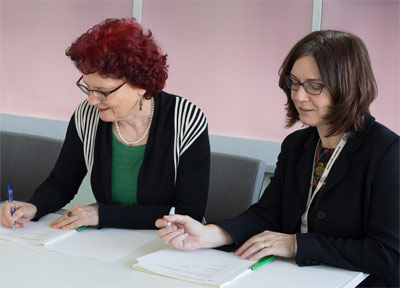Commitment to collaborate on using genomics for pathogen surveillance across Europe
Leaders from the Wellcome Sanger Institute and the European Centre for Disease Prevention and Control have signed a framework collaboration agreement, agreeing to work in partnership to help enable and improve the use of genomic technologies in monitoring dangerous bacteria in the European Union and European Economic Area.
Signing at a ceremony in Stockholm on 26th February, the leaders demonstrated the importance of collaboration and cross-border research. The two organisations aim to collaborate effectively to foster the wider use of whole genome sequencing as the frontline method for surveillance of disease-causing bacteria. This will help inform public health protection across Europe.

Pathogenic bacteria infect millions of people every year worldwide and are responsible for many diseases, including tuberculosis, cholera and pneumonia. Some of these pathogenic bacteria have also developed drug resistance such as methicillin-resistant Staphylococcus aureus (MRSA), which is resistant to multiple antibiotics and which can cause life-threatening infections in hospitals. Understanding how these bacteria emerge and spread is key to good public health.
Based at the Wellcome Sanger Institute, the Centre for Genomic Pathogen Surveillance (CGPS) aims to understand the emergence and spread of diseases and drug resistance, by carrying out global surveillance of pathogens using whole genome sequencing, and developing tools to analyse, visualise and deliver information to understand this.
The European Centre for Disease Prevention and Control (ECDC) is the European Union (EU) agency that identifies, assesses and communicates current and emerging threats to human health posed by infectious diseases. By agreeing to work in partnership, the CGPS and the ECDC can help improve the monitoring and surveillance of pathogens across Europe.
“Pathogens do not respect borders. By working together we have established a real commitment to drive the uptake and utility of whole genome sequencing and methods for understanding pathogen spread throughout Europe. Genomic technology provides clear information on bacterial strains present in countries, can point to spread within and between countries and is becoming a gold-standard tool for surveillance.”
Professor David Aanensen, Group leader at the Wellcome Sanger Institute and Director of the Centre for Genomic Pathogen Surveillance
“It is vital to monitor pathogenic bacteria and the spread of drug resistance to help inform public health policies. We are delighted about this agreement between our two organisations as it aligns with the core scientific aims and strategy of the Sanger Institute, and helps to consolidate the impact of genomics on public health.”
Dr Julia Wilson, Associate Director of the Wellcome Sanger Institute
More information
Selected websites
The European Centre for Disease Prevention and Control
The European Centre for Disease Prevention and Control (ECDC) is an EU agency established in 2005. ECDC’s mission is to identify, assess and communicate current and emerging threats to human health posed by infectious diseases.
In 2019, ECDC will adopt a “Strategic framework for integration of molecular and genomic data for EU surveillance and cross-border outbreak investigations”, updating the current strategy. ECDC will prioritise diseases and outlines technical implementation options for the medium-term (2019–21) use of genomic information into EU-level surveillance and multi-country outbreak investigations.
ECDC’s plan is to work jointly with the EU/EEA Member States on the gradual implementation and integration of sequence-based typing data to support three distinct applications by objective: outbreak investigations, control-oriented surveillance aiming at early outbreak detection, and strategy-oriented surveillance to monitor longer term disease trends and effectiveness of prevention programmes. The latter category includes upcoming surveys of antibiotic-resistant Neisseria gonorrhoeae and carbapenem- or colistin-resistant Enterobacteriaceae whose genomic parts will be carried out through scientific collaborations between ECDC and the Wellcome Sanger Institute.
- ECDC Homepage: https://ecdc.europa.eu/en/home
- Molecular and genomic typing at ECDC: https://ecdc.europa.eu/en/molecular-and-genomic-typing
The Centre for Genomic Pathogen Surveillance
The Centre for Genomic Pathogen Surveillance is an initiative based at the Wellcome Genome Campus focussed on genomic epidemiology, laboratory and software engineering for global surveillance of microbial pathogens. The Centre seeks to provide genomic and epidemiological big data and tools to allow researchers, doctors and governments worldwide to track and analyse the spread of pathogens and antimicrobial resistance.
The Wellcome Sanger Institute
The Wellcome Sanger Institute is one of the world’s leading genome centres.
Through its ability to conduct research at scale, it is able to engage in bold and long-term exploratory projects that are designed to influence and empower medical science globally. Institute research findings, generated through its own research programmes and through its leading role in international consortia, are being used to develop new diagnostics and treatments for human disease.
Find out more at www.sanger.ac.uk or follow @sangerinstitute on Twitter, Facebook, LinkedIn and on our Blog.
Wellcome
Wellcome exists to improve health for everyone by helping great ideas to thrive. We’re a global charitable foundation, both politically and financially independent. We support scientists and researchers, take on big problems, fuel imaginations and spark debate. wellcome.org



